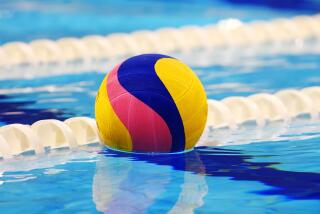Duplanty’s Time in the Pool Is Usually Short, but Sweet : Water polo: As the backup goalkeeper, he does more cheerleading than playing, but he’s always ready.
- Share via
NEWPORT BEACH — Chris Duplanty doesn’t mind that his Olympic experience can be measured in seconds: 34 seconds to be exact.
Duplanty, then 22 and the youngest player on the U.S. Olympic water polo team, remembers vividly his brief appearance as goalkeeper in the second quarter of a match against China in the 1988 Summer Games in Seoul.
“It was hilarious,” Duplanty said. “All the families were sitting together, so when I stood up to go in they were screaming and yelling. I finished the quarter and I came right back out and they were waving and laughing.
“I got one save or two saves and a pass; those would be my stats for the Olympics.”
It’s likely Duplanty’s statistics won’t be much better in Barcelona. As the backup to Craig Wilson, considered by many the best water polo goalkeeper in the world, Duplanty again doesn’t figure to get much playing time.
“Duplanty has the hardest job on the whole team because being the backup goalie to Wilson, he’s not going to see much action,” U.S. Coach Bill Barnett said. “He’s there basically as a cheerleader.”
It’s a role Duplanty understands.
“The first thing that I’m concerned with is how the team does,” Duplanty said. “What I want individually as a player is and should be secondary to the team.
“So if the team does well and there are opportunities for me to get in, that would be great.”
Those opportunities will probably be limited to giving Wilson rests early in the tournament so he can be fresh later as the Americans attempt to win their first gold medal in water polo since 1904.
Of course, if Wilson were to be injured, Duplanty would take over, but unlike NFL backup quarterbacks, reserve water polo goalkeepers aren’t often called upon to replace injured starters.
Still Duplanty has been compared to Steve Young, the San Francisco 49ers quarterback who has backed up Joe Montana for much of the last five years.
“It’s hard to sit no matter who you are,” Duplanty said. “I try to train just like everybody else. I feel like I’d be letting the team down if I took advantage of the situation of being a cheerleader. If I just practiced my yelling and screaming and towel waving, I think that would be letting down the team.
“I almost have to prepare for the worst scenario, and I think a Steve Young or any other backup would do the same.”
To a certain extent, Duplanty’s diligence has paid off. After his brief appearance in Seoul, he returned to UC Irvine and led the Anteaters to an NCAA title in 1989. Duplanty was also in goal at the World University Games last summer and helped the United States win the competition for only the second time ever.
“That was a chance for me to play and really feel like I was part of the team,” Duplanty said. “I got a chance to see what Craig goes through all the time.
“It was very satisfying, very fulfilling.”
Since the last Olympics, Duplanty’s playing time for the U.S. team has increased. Barnett has given him chances to face powerful teams such as Spain and the Commonwealth of Independent States in exhibition matches.
In fact, Barnett believes that the team often plays better defense when Duplanty enters the pool.
Barnett explains: “Sometimes, I think because Wilson is so talented, the field players don’t play as good defense in front of him, knowing that he’s going to make the save, whereas when Chris gets in there I think they play a bit better defense.”
That may seem like a slightly backhanded compliment but Duplanty puts a different spin on it.
“Craig has a 7-foot-something wing span,” Duplanty said. “I don’t have that, so as a result, I’m very dependent on the team in front of me. So when Barnett says the team plays better defense to a certain degree, I like to think that that’s part of my game.”
But because Wilson, the oldest player on the U.S. team at 35, shows no signs of slowing, Duplanty, 26, hasn’t had the chance to compete at the game’s highest level.
Although he’s not complaining about his lack of significant playing time, Duplanty hasn’t decided whether it would be worth his while to stay around for the 1996 Olympics in Atlanta.
Duplanty, who received a master’s degree in business administration from UC Irvine in June, said he will make a decision after playing in Barcelona.
“Barnett calls me a cheerleader and that certainly wasn’t what my goals were,” he said. “One goal was certainly to be on the team but they go beyond that. I mean if that’s what motivated me then after the last Olympics I’d have quit.”
This time 34 seconds might not be enough.
More to Read
Go beyond the scoreboard
Get the latest on L.A.'s teams in the daily Sports Report newsletter.
You may occasionally receive promotional content from the Los Angeles Times.






